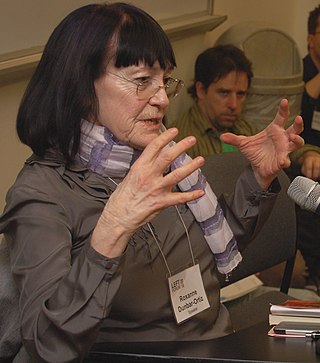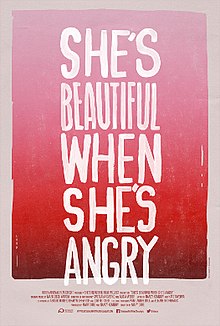Second-wave feminism was a period of feminist activity that began in the early 1960s and lasted roughly two decades, ending with the feminist sex wars in the early 1980s and being replaced by third-wave feminism in the early 1990s. It occurred throughout the Western world and aimed to increase women's equality by building on the feminist gains of the late 19th and early 20th centuries.

Lesbian feminism is a cultural movement and critical perspective that encourages women to focus their efforts, attentions, relationships, and activities towards their fellow women rather than men, and often advocates lesbianism as the logical result of feminism. Lesbian feminism was most influential in the 1970s and early 1980s, primarily in North America and Western Europe, but began in the late 1960s and arose out of dissatisfaction with the New Left, the Campaign for Homosexual Equality, sexism within the gay liberation movement, and homophobia within popular women's movements at the time. Many of the supporters of Lesbianism were actually women involved in gay liberation who were tired of the sexism and centering of gay men within the community and lesbian women in the mainstream women's movement who were tired of the homophobia involved in it.
Susan Brownmiller is an American journalist, author and feminist activist best known for her 1975 book Against Our Will: Men, Women, and Rape, which was selected by The New York Public Library as one of 100 most important books of the 20th century.
Rita Mae Brown is an American feminist writer, best known for her coming-of-age autobiographical novel, Rubyfruit Jungle. Brown was active in a number of civil rights campaigns and criticized the marginalization of lesbians within feminist groups. Brown received the Pioneer Award for lifetime achievement at the Lambda Literary Awards in 2015.
Karla Jay is a distinguished professor emerita at Pace University, where she taught English and directed the women's and gender studies program between 1974 and 2009. A pioneer in the field of lesbian and gay studies, she is widely published.
Lavender Menace was an informal group of lesbian radical feminists formed to protest the exclusion of lesbians and their issues from the feminist movement at the Second Congress to Unite Women in New York City on May 1, 1970. Members included Karla Jay, Martha Shelley, Rita Mae Brown, Lois Hart, Barbara Love, Ellen Shumsky, Artemis March, Cynthia Funk, Linda Rhodes, Arlene Kushner, Ellen Broidy, and Michela Griffo, and were mostly members of the Gay Liberation Front (GLF) and the National Organization for Women (NOW). They later became the Radicalesbians.

Roxanne Dunbar-Ortiz is an American historian, writer, professor, and activist based in San Francisco. Born in Texas, she grew up in Oklahoma and is a social justice and feminist activist. She has written numerous books including Blood on the Border: A Memoir of the Contra Years (2005), Red Dirt: Growing up Okie (1992), and An Indigenous Peoples' History of the United States (2014). She is professor emeritus in Ethnic Studies at California State University.
Frances M. Beal, also known as Fran Beal, is a Black feminist and a peace and justice political activist. Her focus has predominantly been regarding women's rights, racial justice, anti-war and peace work, as well as international solidarity. Beal was a founding member of the SNCC Black Women's Liberation Committee, which later evolved into the Third World Women's Alliance. She is most widely known for her publication, “Double Jeopardy: To Be Black and Female", which theorizes the intersection of oppression between race, class, and gender. Beal currently lives in Oakland, California.

Alix Kates Shulman is an American writer of fiction, memoirs, and essays, and a prominent early radical activist of second-wave feminism. She is best-known for her bestselling debut adult novel, Memoirs of an Ex-Prom Queen, hailed by the Oxford Companion to Women's Writing as "the first important novel to emerge from the Women's Liberation Movement."
The Combahee River Collective (CRC) was a Black feminist lesbian socialist organization active in Boston, Massachusetts, from 1974 to 1980. The Collective argued that both the white feminist movement and the Civil Rights Movement were not addressing their particular needs as Black women and more specifically as Black lesbians. Racism was present in the mainstream feminist movement, while Delaney and Manditch-Prottas argue that much of the Civil Rights Movement had a sexist and homophobic reputation. The Collective was a group that met to discuss the intersections of oppression based on race, gender, heteronormativity, and class and argued for the liberation of Black women on all fronts.
Judith Arcana is an American writer of poems, stories, essays and books. She was a teacher for forty years and her writing has appeared in journals and anthologies since the early 1980s. She has been an activist for reproductive justice since spending two years in the Jane Collective, Chicago's underground abortion service (1970–72). Arcana is notable for her insistence on the organically political nature of art and literature.
Jacqueline "Jacqui" Michot Ceballos is an American feminist and activist. Ceballos is the former president of New York Chapter of the National Organization for Women and founder of the Veteran Feminists of America organization which documents the history of Second wave feminism and pioneer feminists. Ceballos' 1971 debate on sexual politics with Norman Mailer and Germaine Greer is recorded in the 1979 film Town Bloody Hall. Ceballos is also featured in the feminist history film She's Beautiful When She's Angry.
Alta Gerrey was a British-American poet, prose writer, and publisher, best known as the founder of the feminist press Shameless Hussy Press and editor of the Shameless Hussy Review. Her 1980 collection The Shameless Hussy won the American Book Award in 1981. She is featured in the feminist history film She's Beautiful When She's Angry.
Chude Pamela Parker Allen, also known as Pamela Parker, Chude Pamela Allen, Chude Pam Allen, Pamela Allen, and Pam Allen is an American activist of the civil rights movement and women's liberation movement. She was a founder of New York Radical Women.
Ellen Shumsky is a lesbian feminist activist, photographer, psychoanalytic teacher, psychotherapist, supervisor, and writer.

The Red Pill is a 2016 American documentary film directed by Cassie Jaye. The film explores the men's rights movement, as Jaye spends a year filming the leaders and followers within the movement. It premiered on October 7, 2016 in New York City, followed by several other one-time screenings internationally. It was released on DVD and Blu-ray in 2017 by Gravitas Ventures.
Norma Meras Swenson is an activist, a medical sociologist and a leader in the developing woman's health movement. She co-founded the Boston Women's Health Book Collective (BWHBC), and co-authored with the Collective, Our Bodies, Ourselves (OBOS), and served as president of the OBOS nonprofit organization for several years. Swenson was OBOS's first Director of International Programs, which supported the translation and/or adaptation and dissemination of the book into more than 30 languages. She continues to provide support to women's groups and maternal health clinics by assisting women-led organizations that work for social change in maternity care, in reproductive justice, and in healthcare-related human rights. OBOS has impacted women's health in Africa, Asia, Latin America, Europe, the United States and Canada. Swenson consults with national governments, private foundations and organizations, including the World Health Organization.
Marilyn Salzman Webb, also known as Marilyn Webb, is an American author, activist, professor, feminist and journalist. She has been involved in the civil rights, feminist, anti-Vietnam war and end-of-life care movements, and is considered one of the founders of the Second-wave women's liberation movement.
Vivian Leburg Rothstein is a labor rights activist, feminist, and community organizer. She was instrumental in the civil rights movement and the peace movement. She also cofounded the Chicago Women's Liberation Union.
Mary Jean Collins is an American feminist. She was president of the Chicago chapter of the National Organization for Women (NOW), a member of the national board and director of the campaign to have the Equal Rights Amendment (ERA) ratified in Illinois. She led anti-discrimination protests against Sears and AT&T.




